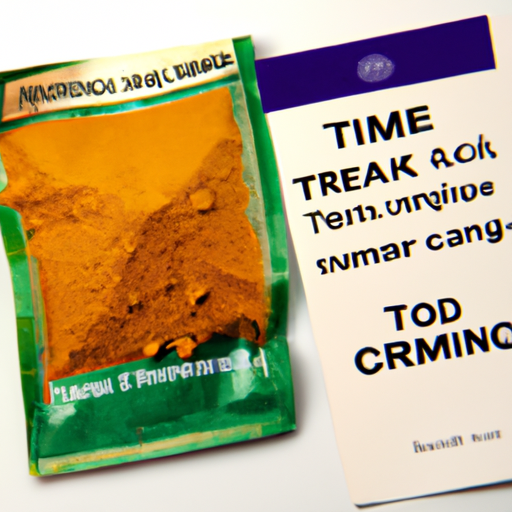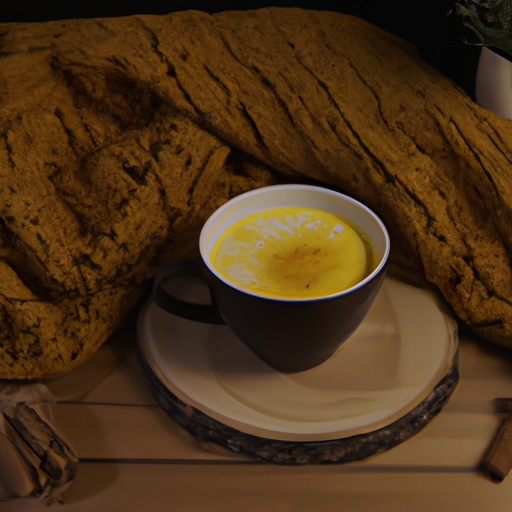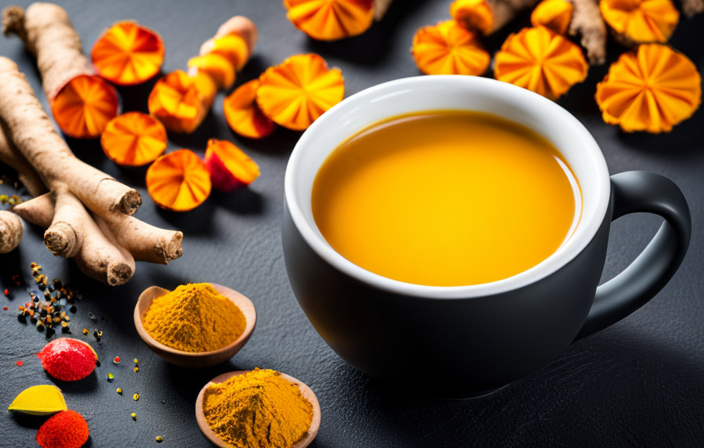As a person dealing with high blood pressure, I am constantly seeking natural remedies to assist in controlling this condition. Lately, there has been a lot of talk about the potential health advantages of turmeric and ginger, and how they could aid in reducing blood pressure levels. Despite my usual reservations about health claims, I took it upon myself to investigate further to see if there is any backing to these assertions.
In this article, I will explore the scientific research on the potential benefits of turmeric and ginger for high blood pressure. I will also provide tips on how to incorporate these herbs into your diet, as well as other natural remedies that may be helpful in managing this condition.
While I am not a medical professional and do not offer medical advice, I hope that this article will be informative and helpful for those looking for natural ways to manage their blood pressure.
Key Takeaways
- Turmeric and ginger have anti-inflammatory and antioxidant properties, which can help reduce inflammation and damage in the body.
- Both turmeric and ginger can be used in cooking to add flavor and boost the anti-inflammatory benefits of your meals.
- Turmeric and ginger may have beneficial effects on blood pressure by improving endothelial function and lowering inflammation.
- While turmeric and ginger can be incorporated into a healthy diet to help lower blood pressure, they should not be used as a substitute for prescribed medication and it’s important to consult with a healthcare provider before making significant changes to your diet or exercise routine.
Understanding High Blood Pressure
Let’s talk about what high blood pressure is and why it’s important to understand it. Understanding hypertension is crucial because it’s one of the leading causes of heart disease and stroke.
Hypertension is when the force of blood against the walls of your arteries is consistently too high. When this happens, it can damage the arteries and lead to serious health problems.
There are many causes of hypertension, including genetics, age, lifestyle choices, and underlying medical conditions. Some of these risk factors, such as age and genetics, can’t be changed. However, making healthy lifestyle choices such as maintaining a healthy weight, exercising regularly, and reducing salt intake can help to lower blood pressure.
Now, let’s discuss how turmeric and ginger may play a role in managing high blood pressure.
The Health Benefits of Turmeric and Ginger
I’ve always been interested in the health benefits of natural remedies, and two that have caught my attention are turmeric and ginger.
These spices have been used for centuries in traditional medicine, and recent research has shown that they have anti-inflammatory properties and antioxidant effects.
These health benefits make turmeric and ginger promising options for managing various health conditions.
Anti-inflammatory Properties
You might be surprised to learn that both turmeric and ginger have anti-inflammatory benefits that can help with high blood pressure. Inflammation is like a fire in your body that can cause damage over time, while turmeric and ginger work like water to put out the flames and prevent further harm. Here are some ways these spices can help:
-
Turmeric contains an active compound called curcumin, which has been shown to reduce inflammation in the body. This can lead to improved blood flow and lower blood pressure.
-
Ginger contains gingerols, which have been found to have similar anti-inflammatory effects. Ginger can also improve circulation and help relax blood vessels.
-
Both turmeric and ginger can be used in cooking to add flavor and boost the anti-inflammatory benefits of your meals.
-
Adding these spices to your diet can be an easy and delicious way to incorporate natural anti-inflammatory benefits into your daily routine.
In addition to their anti-inflammatory benefits, turmeric and ginger also have antioxidant effects that can help protect against damage from free radicals.
Let’s explore this further in the next section.
Antioxidant Effects
Did you know that incorporating antioxidant-rich foods into your diet can help protect your body against damage from free radicals? Antioxidants are compounds that neutralize free radicals, which are unstable molecules that can cause oxidative stress and damage to cells. Fortunately, both turmeric and ginger are excellent sources of antioxidants.
Turmeric contains a compound called curcumin, which has been shown to have potent antioxidant effects. In fact, studies have found that curcumin can neutralize free radicals and reduce oxidative stress in the body. Similarly, ginger contains compounds called gingerols and shogaols, which also have antioxidant benefits. Incorporating turmeric and ginger into your diet can help protect your body against oxidative stress and reduce the risk of chronic diseases. However, it is important to note that dosage considerations should be taken into account when using these herbs for medicinal purposes.
Research on turmeric and ginger for blood pressure supports their use as a natural alternative to traditional medications.
Research on Turmeric and Ginger for Blood Pressure
Exploring the research on turmeric and ginger shows that they may have beneficial effects on blood pressure. Turmeric and ginger are natural anti-inflammatory agents that have been shown to improve endothelial function, which can help lower blood pressure. However, it’s important to note that turmeric and ginger shouldn’t be used as a substitute for prescribed blood pressure medication.
Potential side effects of turmeric and ginger include gastrointestinal issues and allergic reactions. Dosage recommendations for turmeric and ginger research vary, but it’s generally recommended to consume no more than 1-2 teaspoons of ground turmeric or 1-2 grams of fresh ginger per day. It’s also important to consult with a healthcare provider before incorporating turmeric and ginger into your diet, especially if you’re taking blood pressure medication or have a history of blood clotting disorders.
Incorporating turmeric and ginger into your diet can be as simple as adding them to your favorite dishes or beverages. For example, turmeric can be added to scrambled eggs or smoothies, while ginger can be added to stir-fries or tea. By incorporating these natural anti-inflammatory agents into your diet, in conjunction with prescribed blood pressure medication, you may potentially see improvements in your blood pressure levels.
How to Incorporate Turmeric and Ginger into Your Diet
Adding a dash of these flavorful spices to your meals and beverages can add a touch of exoticism to your cuisine while potentially promoting cardiovascular health. Incorporating turmeric and ginger into your diet is easy and can be done in many ways. For example, you can use turmeric to make a delicious curry or add ginger to your smoothie for a spicy kick. You can also make turmeric and ginger tea, which has been shown to have numerous health benefits.
To help you get started, here are some turmeric and ginger recipes that you can try at home:
| Recipe | Ingredients | Directions |
|---|---|---|
| Turmeric Tea | 1 tsp turmeric powder, 1 tsp honey, 1 cup water | Boil water, add turmeric powder, and let steep for 10 minutes. Add honey and enjoy. |
| Ginger Turmeric Smoothie | 1 banana, 1 cup almond milk, 1 tsp turmeric powder, 1 tsp grated ginger | Blend all ingredients together and enjoy. |
| Turmeric Roasted Vegetables | Assorted vegetables (such as carrots, Brussels sprouts, and sweet potatoes), 1 tsp turmeric powder, 1 tbsp olive oil | Preheat oven to 375°F. Toss vegetables with turmeric powder and olive oil. Roast for 30-40 minutes or until tender. |
| Ginger Soy Dressing | 2 tbsp soy sauce, 1 tbsp grated ginger, 2 tbsp rice vinegar, 1 tsp honey | Whisk all ingredients together and drizzle over your favorite salad. |
Incorporating turmeric and ginger into your diet can be a simple and delicious way to potentially improve your cardiovascular health. However, it is important to remember that these spices should not replace medical treatment for high blood pressure. In the next section, we will explore other natural remedies that can be used in conjunction with diet and lifestyle changes to manage high blood pressure.
Other Natural Remedies for High Blood Pressure
So, as I’m researching natural remedies for high blood pressure, I’ve come across two key points: lifestyle changes and alternative therapies.
Making lifestyle changes like exercise, diet, and stress management can significantly impact blood pressure.
Alternative therapies such as acupuncture, meditation, and massage may also be helpful in reducing blood pressure.
Lifestyle Changes
To lower your blood pressure, you can make lifestyle changes such as increasing physical activity and reducing stress, as well as incorporating turmeric and ginger into your diet.
Exercise routines are an effective way to reduce high blood pressure. Regular physical activity strengthens the heart, which helps it to pump blood more efficiently, leading to lower blood pressure. You can start with simple exercises such as walking or cycling and gradually increase the intensity and duration of your workout.
In addition to exercise, dietary restrictions can also help to lower high blood pressure. Reducing salt intake is crucial as excessive salt consumption can increase blood pressure. It’s also recommended to limit the consumption of processed foods, red meat, and alcohol.
Incorporating turmeric and ginger into your diet can also be beneficial. Both turmeric and ginger have anti-inflammatory properties that can reduce inflammation in the body, which is linked to high blood pressure. However, it’s important to consult with a healthcare professional before making any significant changes to your diet or exercise routine.
Alternative therapies such as acupuncture and meditation can also be used as a complementary approach to lower high blood pressure.
Alternative Therapies
As I mentioned earlier, lifestyle changes such as regular exercise and a healthy diet can significantly lower blood pressure. However, some people may also benefit from alternative therapies like acupuncture and aromatherapy.
Acupuncture involves inserting thin needles into specific points on the body to stimulate natural healing and improve circulation. Studies have shown that acupuncture can lower blood pressure by reducing stress and promoting relaxation.
Aromatherapy, on the other hand, uses essential oils to improve physical and mental health. Some essential oils, such as lavender and ylang-ylang, have been shown to lower blood pressure and reduce anxiety levels.
While these alternative therapies may not work for everyone, they can be a helpful addition to traditional treatments for high blood pressure.
Frequently Asked Questions
Are turmeric and ginger safe to consume if you are taking blood pressure medication?
Taking turmeric and ginger while on blood pressure medication can have interactions, so it’s important to consult with a doctor. The recommended daily intake of turmeric is 500-2,000mg, while ginger is safe up to 4g.
Can consuming too much turmeric and ginger have negative effects on your health?
Excessive consumption of turmeric and ginger may have negative health effects. Evidence-based studies suggest that moderation is key to balancing the benefits and risks, particularly for cardiovascular health.
How long does it take for turmeric and ginger to have an impact on high blood pressure?
On average, it takes 8 weeks of consistent consumption of turmeric and ginger to see a significant impact on high blood pressure. Recommended dosage is up to 1-2 teaspoons daily.
Are there any specific recipes or preparations that are particularly effective for incorporating turmeric and ginger into your diet for high blood pressure?
I enjoy incorporating turmeric and ginger into my diet for their many benefits, including potential blood pressure-lowering effects. Recipes like turmeric-ginger tea, smoothies, and curries offer delicious ways to incorporate these spices while also enjoying their taste.
Are there any potential interactions or conflicts with other natural remedies for high blood pressure?
I researched potential interactions of natural remedies for high blood pressure. Some can cause side effects, so it’s best to consult a doctor before taking them. Dosage recommendations vary and depend on individual factors.
Conclusion
Wow, after researching and analyzing the benefits of turmeric and ginger for high blood pressure, I’m convinced that these two spices are nothing short of miraculous!
Not only are they delicious and easy to incorporate into meals, but they’ve been proven to have positive effects on blood pressure.
The research speaks for itself – studies have shown that turmeric and ginger can help lower blood pressure and reduce inflammation in the body.
But wait, there’s more! Turmeric and ginger are also packed with antioxidants and anti-inflammatory compounds, making them powerful allies for overall health and wellness.
And the best part? These natural remedies come without any harmful side effects, unlike many prescription medications for high blood pressure.
So, if you’re looking for a safe and effective way to manage your blood pressure, give turmeric and ginger a try.
Your taste buds and your body will thank you!










